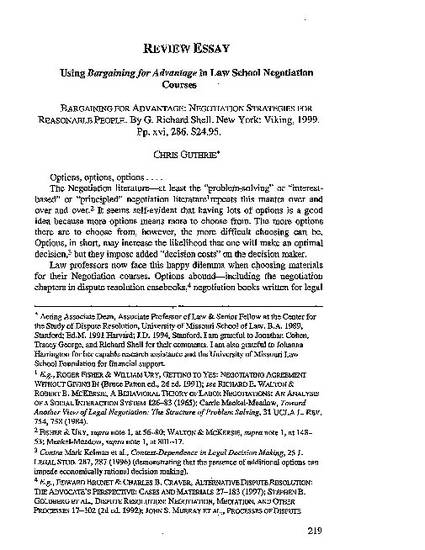
- negotiation,
- bargaining for advantage,
- leverage
Options, options, options ....The Negotiation literature-at least the "problem-solving" or "interestbased" or "principled" negotiation literature'repeats this mantra over and over and over. It seems self-evident that having lots of options is a good idea because more options means more to choose from. The more options there are to choose from, however, the more difficult choosing can be. Options, in short, may increase the likelihood that one will make an optimal decision, but they impose added "decision costs" on the decision maker. Law professors now face this happy dilemma when choosing materials for their Negotiation courses. Options abound-including the negotiation chapters in dispute resolution casebooks, negotiation books written for legal audiences, negotiation books written for non-legal audiences, and a number of good articles--but choosing among them is no easy matter. Richard Shell--a Professor of Legal Studies at the Wharton School of Business-has made this task even more difficult with the publication of his important book, Bargaining for Advantage: Negotiation Strategies for Reasonable People. Such luminaries in the negotiation field as Max Bazerman (Kellogg Graduate School of Business), Rod Kramer (Stanford Business School), Howard Raiffa (Harvard Business School), and Larry Susskind (MIT Public Policy) have enthusiastically endorsed the book. Noticeably absent, however, is any commentary from the legal academy about the book's value to law students and lawyers. This review essay seeks to fill that void. My modest aim is to help law professors decide whether Bargaining for Advantage is worth adopting in whole or part in their Negotiation courses.
Available at: http://works.bepress.com/chris-guthrie/11/
